Every Mother's Dilemma

It's an issue that strikes at the hearts of millions of American women: Can you be a great mother and a successful career woman? Is it possible for women to have it all?
In an Oprah.com poll, more than 15,000 women—both stay-at-home and working moms—opened up about their feelings on motherhood.
Two-thirds of the working moms who responded said they would quit work and stay home with their kids if they could. More than 90 percent said they work for financial reasons.
Read all the results from the poll.
Among the stay-at-home moms, more than one-third wished they worked outside the home.
In an Oprah.com poll, more than 15,000 women—both stay-at-home and working moms—opened up about their feelings on motherhood.
Two-thirds of the working moms who responded said they would quit work and stay home with their kids if they could. More than 90 percent said they work for financial reasons.
Read all the results from the poll.
Among the stay-at-home moms, more than one-third wished they worked outside the home.

In January 2006, following the death of Peter Jennings, 43-year-old Elizabeth Vargas was named co-anchor of ABC's World News Tonight, one of the most prestigious jobs in television news. The job required Elizabeth and her co-anchor, Bob Woodruff, to travel to some of the most dangerous places in the world.
Just weeks into their new assignment, Bob was reporting from Iraq when he and a cameraman were nearly killed by a roadside bomb explosion. Days after this shocking development, Elizabeth revealed to her bosses that she had recently found out she was pregnant with her second child. With everyone hoping that Bob would quickly recover, Elizabeth initially planned to continue as sole anchor until giving birth, after which she'd take a short maternity leave and then return to the anchor's chair.
Bob's injuries, however, were too serious for that speedy of a recovery. Elizabeth began having second thoughts, as well. "Over the period of those five or six months after Bob's injury, it became clear that it was going to be a tough job to do once this baby arrived," Elizabeth says. "My husband was not keen on the plan of me hopping on airplanes and disappearing for a week at a time and leaving him and my children, especially a baby, for that long and going to places that are horribly dangerous."
Just weeks into their new assignment, Bob was reporting from Iraq when he and a cameraman were nearly killed by a roadside bomb explosion. Days after this shocking development, Elizabeth revealed to her bosses that she had recently found out she was pregnant with her second child. With everyone hoping that Bob would quickly recover, Elizabeth initially planned to continue as sole anchor until giving birth, after which she'd take a short maternity leave and then return to the anchor's chair.
Bob's injuries, however, were too serious for that speedy of a recovery. Elizabeth began having second thoughts, as well. "Over the period of those five or six months after Bob's injury, it became clear that it was going to be a tough job to do once this baby arrived," Elizabeth says. "My husband was not keen on the plan of me hopping on airplanes and disappearing for a week at a time and leaving him and my children, especially a baby, for that long and going to places that are horribly dangerous."
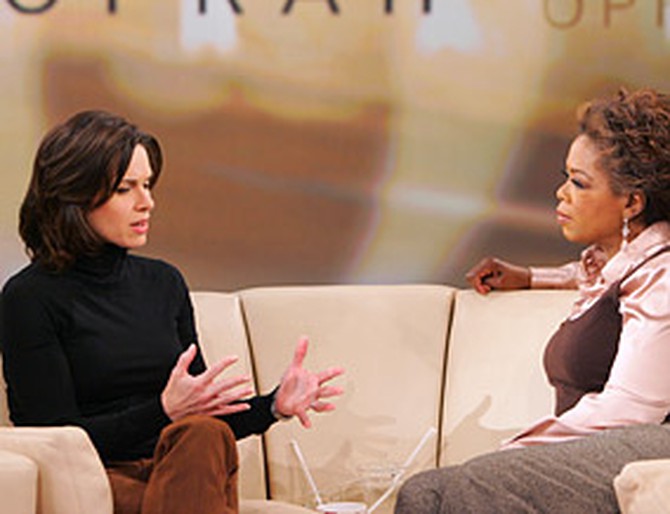
After discussing the situation with her husband and her supervisors at the network, Elizabeth announced on the air her decision to step down as anchor of ABC's World News Tonight—a job she worked 20 years to attain.
"It was a very difficult, excruciating decision, and I still have a lot of doubt and anguish over whether it was the right decision," she says. "I believe it was, but it was so hard to walk away from that."
Elizabeth says her stint as network news anchor introduced an even greater degree of difficulty to being a working mother. "When news breaks anywhere in the world, you have to hop on a plane and go there. I love that, but I felt like, 'How am I going to do that with a newborn infant? It was hard for me getting to Chicago with my breast pump and all my breast milk bottles. How am I going to go to the Middle East the next time something happens?'"
Since the birth of her second child, Elizabeth has returned to ABC News, anchoring the weekly newsmagazine 20/20. She says the nature of a weekly show, rather than a nightly show, is better for her and her family. "The difference in anchoring 20/20 is that I have a lot more flexibility. I can sort of call my own shots a tad more. With World News Tonight you're out the door at 8 a.m. and back in at 8 p.m., and that's non-negotiable. ... It's an intensely demanding job."
"It was a very difficult, excruciating decision, and I still have a lot of doubt and anguish over whether it was the right decision," she says. "I believe it was, but it was so hard to walk away from that."
Elizabeth says her stint as network news anchor introduced an even greater degree of difficulty to being a working mother. "When news breaks anywhere in the world, you have to hop on a plane and go there. I love that, but I felt like, 'How am I going to do that with a newborn infant? It was hard for me getting to Chicago with my breast pump and all my breast milk bottles. How am I going to go to the Middle East the next time something happens?'"
Since the birth of her second child, Elizabeth has returned to ABC News, anchoring the weekly newsmagazine 20/20. She says the nature of a weekly show, rather than a nightly show, is better for her and her family. "The difference in anchoring 20/20 is that I have a lot more flexibility. I can sort of call my own shots a tad more. With World News Tonight you're out the door at 8 a.m. and back in at 8 p.m., and that's non-negotiable. ... It's an intensely demanding job."
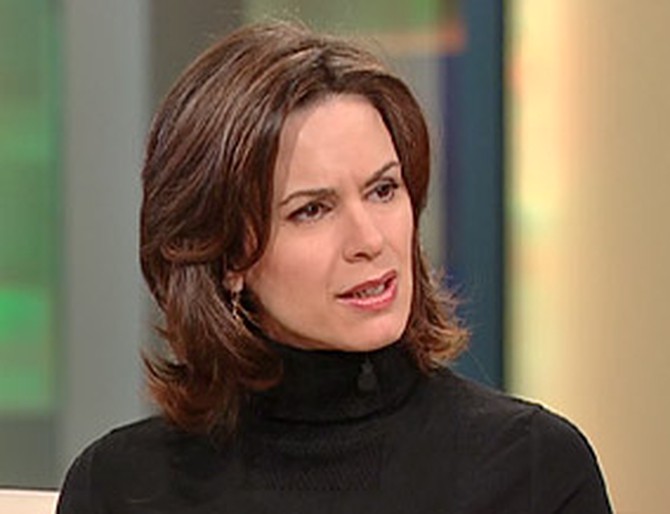
Elizabeth says she wants to clarify something about her departure from World News Tonight. Despite some reports to the contrary, she was not forced out. "We got a letter of protest from [the National Organization of Women] to the president of ABC saying, 'This is a step back for working women and she was pushed out because she's pregnant.' At one point I said, 'I think feminism means we all get that chance to make our choice. And if it just isn't right for me, it isn't right for me.' ... For me it just wasn't working."
In Elizabeth's first reporting assignment at 20/20 after maternity leave, she did a special report on working moms in America. She says it was an eye-opening experience. "I was surprised when I found out how far the United States does lag behind other industrialized countries when it comes to paid maternity leave or family flexible policies," she says. "We are actually one of only four countries in the entire world that doesn't offer a national maternity leave program—Papua New Guinea, Swaziland and Lesotho are the other three countries. A lot of our European counterparts who have more socialized governments offer paid maternity leave. But even Japan, which is a capitalist society, offers paid maternity leave."
Elizabeth says she was also surprised to hear of the resentment that some childless people feel toward their colleagues who have kids. "Listen, I have to tell you. I was in the workforce as a childless woman for 20 years," she says. "I had no clue how hard it was for my colleagues who were parents all that time until I became one. I just have to say it's really hard to imagine until you're actually in that position."
In Elizabeth's first reporting assignment at 20/20 after maternity leave, she did a special report on working moms in America. She says it was an eye-opening experience. "I was surprised when I found out how far the United States does lag behind other industrialized countries when it comes to paid maternity leave or family flexible policies," she says. "We are actually one of only four countries in the entire world that doesn't offer a national maternity leave program—Papua New Guinea, Swaziland and Lesotho are the other three countries. A lot of our European counterparts who have more socialized governments offer paid maternity leave. But even Japan, which is a capitalist society, offers paid maternity leave."
Elizabeth says she was also surprised to hear of the resentment that some childless people feel toward their colleagues who have kids. "Listen, I have to tell you. I was in the workforce as a childless woman for 20 years," she says. "I had no clue how hard it was for my colleagues who were parents all that time until I became one. I just have to say it's really hard to imagine until you're actually in that position."
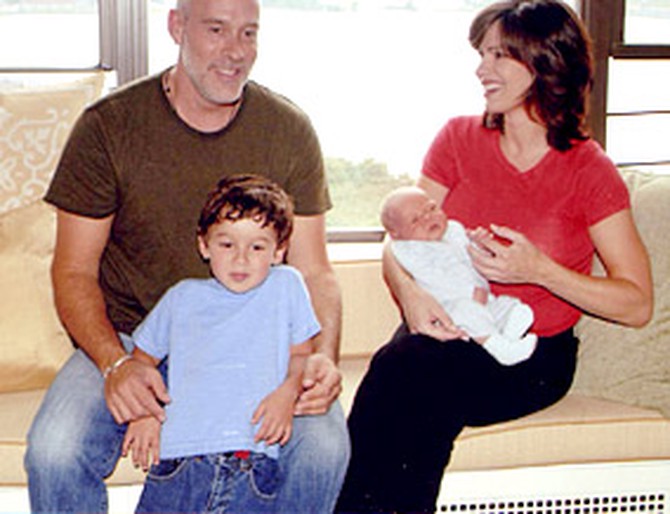
Now that her maternity leave is over and she is back working at 20/20, Elizabeth has more time for her family than she would if she were still at World News Tonight. But she is still a working mother—which inevitably means she feels pressure and guilt that she's not doing enough.
"I love my job but I always feel like I'm not doing everything the way I would be if I didn't have all these other responsibilities," she says. "To be brutally honest, I think I spend 90 percent of my days feeling like I'm never getting anything done quite right."
Between anchoring and meetings, Elizabeth squeezes in time with her 4-year-old son, Zachary, who occasionally comes to work for a visit. And like many working moms, she says she's wracked with guilt.
"I wish I could do it all, but that's not physically possible. I have a sleepless night every night. I wake up at two o'clock and worry: Am I being a good enough mother? Was 20/20 going to be a good show? Should I have done more? Should I have been at the school play? I leave early in the morning and I get home at dinnertime and no matter how many times you ask your 4-year-old how was your day, you know you're aware of the fact that you've missed 98 percent of their day because you've been at work."
"I love my job but I always feel like I'm not doing everything the way I would be if I didn't have all these other responsibilities," she says. "To be brutally honest, I think I spend 90 percent of my days feeling like I'm never getting anything done quite right."
Between anchoring and meetings, Elizabeth squeezes in time with her 4-year-old son, Zachary, who occasionally comes to work for a visit. And like many working moms, she says she's wracked with guilt.
"I wish I could do it all, but that's not physically possible. I have a sleepless night every night. I wake up at two o'clock and worry: Am I being a good enough mother? Was 20/20 going to be a good show? Should I have done more? Should I have been at the school play? I leave early in the morning and I get home at dinnertime and no matter how many times you ask your 4-year-old how was your day, you know you're aware of the fact that you've missed 98 percent of their day because you've been at work."
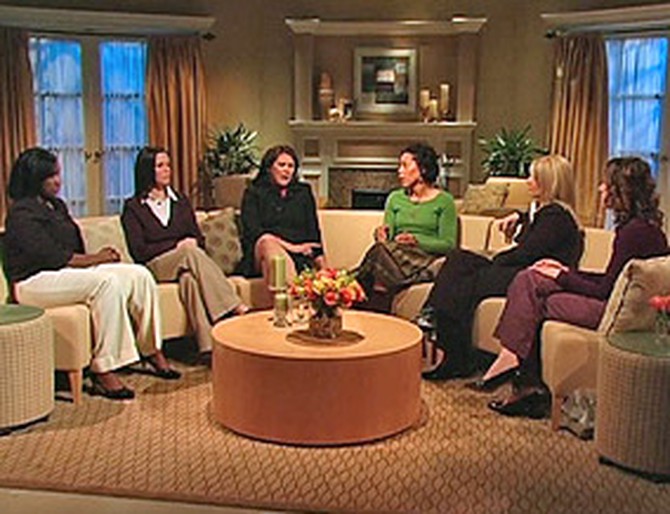
A group of mothers—both working and stay-at-home—participated in an Oprah Show discussion about how they made their decision to stay home or work.
Jallon, a school principal and mother of two toddlers, says, "I think staying home would be frustrating for me. I think it just might drive me crazy."
Lisa, the stay-at-home mother of two children, says, "I feel like, because I do stay home, I'm making my children a priority. If you're working outside of the home, they can't be your top priority."
Christian went back to work after staying home with her children for a year and a half. "I did not get the kind of satisfaction that I wanted to so I went back to work," she says. "I can't imagine going back to being a stay-at-home mom."
Whitney stays home with her 3-year-old daughter. "I think that every family should explore either the husband or the wife staying at home," she says. "You can never recapture that opportunity and explore and grow with your child."
Barbara, the mother of three, says she's glad that she decided to be a working mother. "If you don't have something that is your own, then your kids become everything. And you need to make that separation about what you're doing for your kids and what you're doing for yourself."
Watch as the working moms and stay-at-home moms debate which lifestyle is best.
Jallon, a school principal and mother of two toddlers, says, "I think staying home would be frustrating for me. I think it just might drive me crazy."
Lisa, the stay-at-home mother of two children, says, "I feel like, because I do stay home, I'm making my children a priority. If you're working outside of the home, they can't be your top priority."
Christian went back to work after staying home with her children for a year and a half. "I did not get the kind of satisfaction that I wanted to so I went back to work," she says. "I can't imagine going back to being a stay-at-home mom."
Whitney stays home with her 3-year-old daughter. "I think that every family should explore either the husband or the wife staying at home," she says. "You can never recapture that opportunity and explore and grow with your child."
Barbara, the mother of three, says she's glad that she decided to be a working mother. "If you don't have something that is your own, then your kids become everything. And you need to make that separation about what you're doing for your kids and what you're doing for yourself."
Watch as the working moms and stay-at-home moms debate which lifestyle is best.
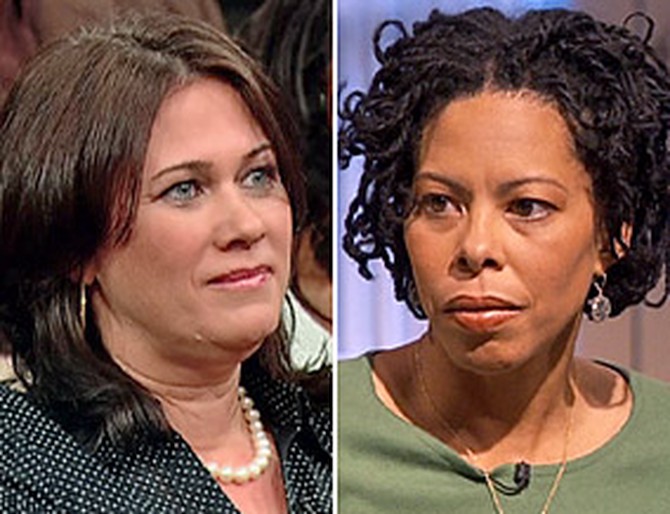
As the conversation continues, Barbara (left), one of the working mothers, says, "It's more important, I think, that you're around when your kids are teenagers. You know, anybody can read your kid a book or cuddle your kid. Not anybody can ask your kid how the soccer game went or cheer them on at the soccer game."
Barbara's views on motherhood upset Whitney (right), a stay-at-home mom. "I think that sometimes using phrases like that minimizes what being a stay-at-home mom is. It's not just about reading a book or wiping their nose. It's engendering in them a sense of independence and a quest for learning that is shaped by your values."
Whitney says that all mothers should seriously consider staying home as she has. "I think they should be willing to be flexible, to take a long-term view," she says. "I think it's very important to be there for your child if you are financially able, if you are in a position of financial privilege that you can even consider that."
Barbara's views on motherhood upset Whitney (right), a stay-at-home mom. "I think that sometimes using phrases like that minimizes what being a stay-at-home mom is. It's not just about reading a book or wiping their nose. It's engendering in them a sense of independence and a quest for learning that is shaped by your values."
Whitney says that all mothers should seriously consider staying home as she has. "I think they should be willing to be flexible, to take a long-term view," she says. "I think it's very important to be there for your child if you are financially able, if you are in a position of financial privilege that you can even consider that."
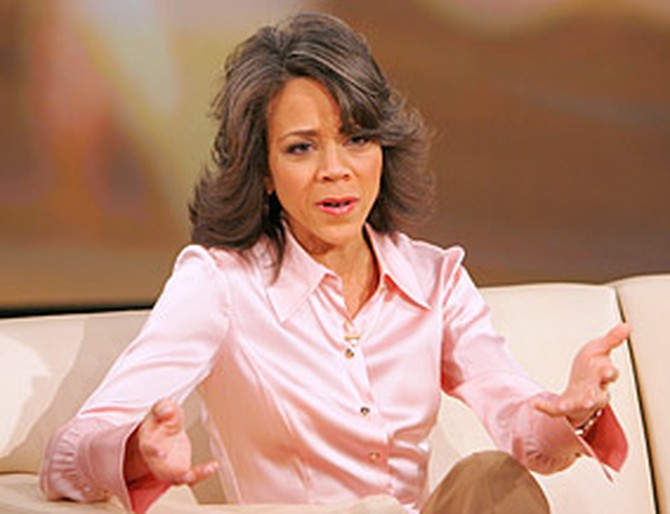
Stay-at-home moms and working mothers may disagree on many issues, but psychologist Dr. Robin Smith, an Oprah Radio host, says it doesn't have to be that way. The bottom line is that all mothers want the same things for their families.
"America is an either/or country," she says. "We're a black or white, pro-life or pro-choice, Democrat or Republican. There's all this splitting that we do, and we lose the wisdom of both worlds. We lose the wisdom of being able to be women at our best—blessing the journey of someone who has found their way and not trying to make it your way."
Dr. Robin says women can't have it all. In fact, no one can. "That's an illusion that any of us can have it all," she says. "The goal isn't to have it all...it's to be attuned with yourself and with your children. Attuned means 'I'm connected.'"
If a stay-at-home mother becomes disconnected or exhausted, it's as if she isn't there at all, Dr. Robin says. The same goes for working moms. If a businesswoman is preoccupied with work and checking her Blackberry when she should be cheering on her child at a soccer game, then she might as well have stayed at the office.
Dr. Robin says that if she had attended the mothers' roundtable discussion, she would have asked the women to argue the opposite position—working moms explain why it's important to stay home and stay-at-home moms argue why it's better to work outside the home. "We need to be able to drop our egos, and I mean, the way in which you see the world," she says. "[This] begins to expand our hearts, our minds, our spirits, and it takes the judgment away."
"America is an either/or country," she says. "We're a black or white, pro-life or pro-choice, Democrat or Republican. There's all this splitting that we do, and we lose the wisdom of both worlds. We lose the wisdom of being able to be women at our best—blessing the journey of someone who has found their way and not trying to make it your way."
Dr. Robin says women can't have it all. In fact, no one can. "That's an illusion that any of us can have it all," she says. "The goal isn't to have it all...it's to be attuned with yourself and with your children. Attuned means 'I'm connected.'"
If a stay-at-home mother becomes disconnected or exhausted, it's as if she isn't there at all, Dr. Robin says. The same goes for working moms. If a businesswoman is preoccupied with work and checking her Blackberry when she should be cheering on her child at a soccer game, then she might as well have stayed at the office.
Dr. Robin says that if she had attended the mothers' roundtable discussion, she would have asked the women to argue the opposite position—working moms explain why it's important to stay home and stay-at-home moms argue why it's better to work outside the home. "We need to be able to drop our egos, and I mean, the way in which you see the world," she says. "[This] begins to expand our hearts, our minds, our spirits, and it takes the judgment away."
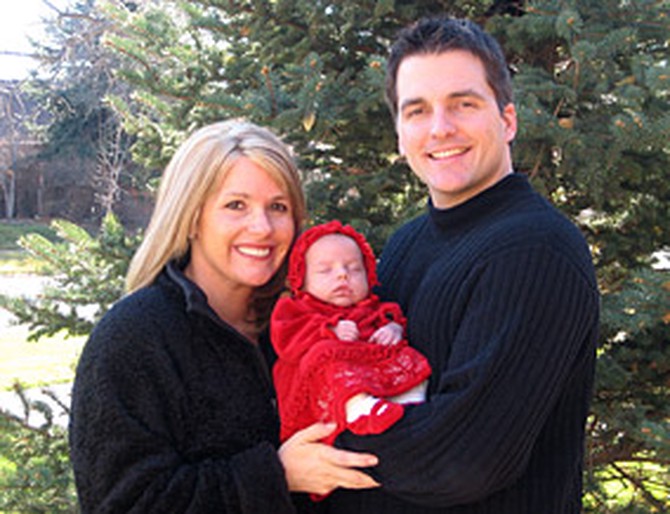
Melissa, a new mom, had every intention of going back to her high-paying career after her first child was born. The day her daughter came into the world, Melissa says her whole world changed. "Our eyes looked at each other, and I fell in love," she says.
After a horrendous pregnancy, Melissa doubts that she'll ever have another child and says she doesn't want to miss a moment of her daughter's development.
"Every day she's changing," she says. "Yesterday she just started gripping onto me, and now she's smiling at me. Someday when I'm a grandma, these are the moments that I'm going to remember—not the Rolex watch that I won at my company."
Maternal instincts are pulling Melissa in one direction, while passion for her profession is pulling her in the opposite direction. If she decides to quit her job, she says she'll miss interacting with clients, dressing up in a suit, working with cancer patients and making her own spending decisions. She also feels guilty about financially "bailing out" on her husband and altering their plans for the future.
After a horrendous pregnancy, Melissa doubts that she'll ever have another child and says she doesn't want to miss a moment of her daughter's development.
"Every day she's changing," she says. "Yesterday she just started gripping onto me, and now she's smiling at me. Someday when I'm a grandma, these are the moments that I'm going to remember—not the Rolex watch that I won at my company."
Maternal instincts are pulling Melissa in one direction, while passion for her profession is pulling her in the opposite direction. If she decides to quit her job, she says she'll miss interacting with clients, dressing up in a suit, working with cancer patients and making her own spending decisions. She also feels guilty about financially "bailing out" on her husband and altering their plans for the future.
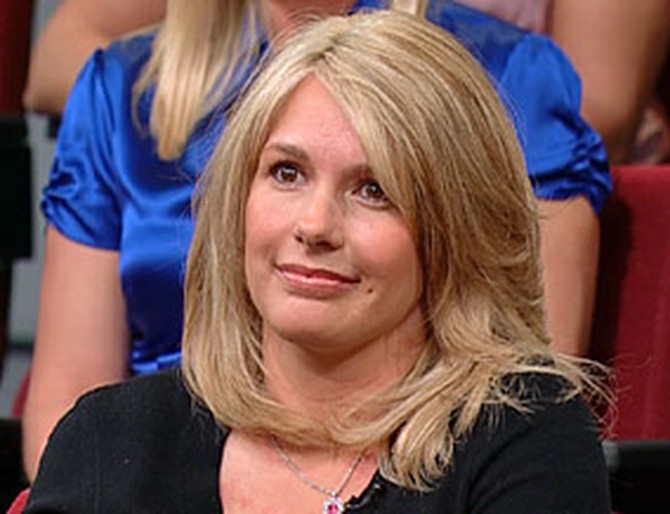
Melissa was all set to enroll her daughter in daycare, but then she had a change of heart. When a woman at the daycare told Melissa to pack a disposable camera each morning so that the employees could photograph important moments in her daughter's life, Melissa says she broke down crying in the parking lot. "I know she didn't mean anything bad by that, but that was just not something to tell a new mom," she says.
Actually, Dr. Robin says, that was exactly what Melissa needed to hear. "It was a gift because it was real," she says. "For mothers who would still choose to work outside of the home, they're saying, 'Let us capture the moments that you might miss.' For you, that stirred you in a way that you thought, 'I'm not sure that I can walk with that miss.'"
Melissa returned to the daycare and asked for a refund. "I talked to my husband and asked him if we could just take one year to think about things, and let me spend some time with [my daughter]," she says. "Then maybe [we can] reevaluate things in a year and see what we should do at that time."
Actually, Dr. Robin says, that was exactly what Melissa needed to hear. "It was a gift because it was real," she says. "For mothers who would still choose to work outside of the home, they're saying, 'Let us capture the moments that you might miss.' For you, that stirred you in a way that you thought, 'I'm not sure that I can walk with that miss.'"
Melissa returned to the daycare and asked for a refund. "I talked to my husband and asked him if we could just take one year to think about things, and let me spend some time with [my daughter]," she says. "Then maybe [we can] reevaluate things in a year and see what we should do at that time."

Peggy (left) is a mother of four who chose to work outside the home while her children were growing up. Another mother, Lynne (right), made a different decision. She quit her high-powered job to stay home with her two daughters. How do these moms feel about the decisions they made many years ago?
"Looking back, my biggest regret is that, for me personally, I missed being with my children and seeing them take their first step," Peggy says. "I missed all their precious moments. ... I cheated myself by continuing to work full time."
Although Lynne saw her children take their first steps and heard their first words, she questions her decision. "I regret [that] by staying at home, so much of me was given to my children and to my family that I kind of got put on the back burner," she says. "In my children's eyes, I'm successful at running my home, cooking dinner, feeding the dog and picking them up from school. I think I did what was right for the girls. Then there's the other part of me that says, 'But what about me now? What about what I gave up?' I want a part of me back."
When Peggy's daughter became a mother, Peggy told her not to follow in her footsteps.
"Looking back, my biggest regret is that, for me personally, I missed being with my children and seeing them take their first step," Peggy says. "I missed all their precious moments. ... I cheated myself by continuing to work full time."
Although Lynne saw her children take their first steps and heard their first words, she questions her decision. "I regret [that] by staying at home, so much of me was given to my children and to my family that I kind of got put on the back burner," she says. "In my children's eyes, I'm successful at running my home, cooking dinner, feeding the dog and picking them up from school. I think I did what was right for the girls. Then there's the other part of me that says, 'But what about me now? What about what I gave up?' I want a part of me back."
When Peggy's daughter became a mother, Peggy told her not to follow in her footsteps.

Laura, Peggy's daughter, says that when she was engaged to be married, her mother sat her down and said, "Whatever you can do, honey, just make sure that you find a way to stay home with your children."
Instead, Laura made the difficult decision to go back to work after starting her family. "When my husband and I first started discussing children, he wanted me to stay home because his mom stayed home, and she was such a great influence for him," Laura says. "I said, 'I don't get it. My mom did it, and she did it all.'"
Peggy may feel cheated as a mother, but Laura says she always felt very loved as a child. Now, she's using the positive example Peggy set to guide her parenting decisions. "She was great at [being a working mom]," Laura says. "She showed us how she could do it so well."
Instead, Laura made the difficult decision to go back to work after starting her family. "When my husband and I first started discussing children, he wanted me to stay home because his mom stayed home, and she was such a great influence for him," Laura says. "I said, 'I don't get it. My mom did it, and she did it all.'"
Peggy may feel cheated as a mother, but Laura says she always felt very loved as a child. Now, she's using the positive example Peggy set to guide her parenting decisions. "She was great at [being a working mom]," Laura says. "She showed us how she could do it so well."
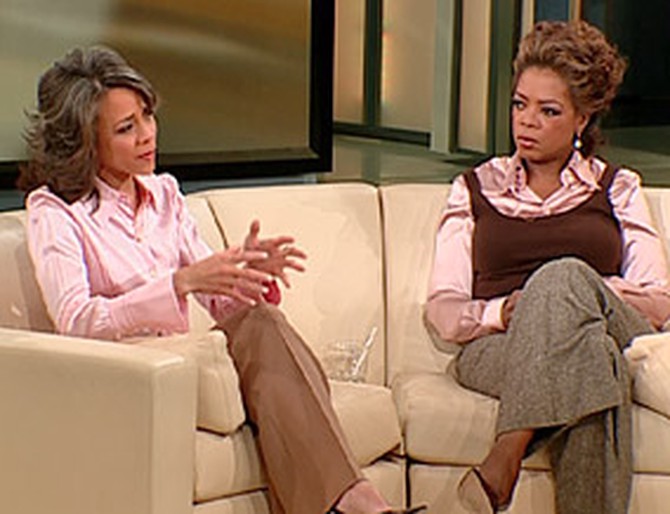
Both stay-at-home moms and working moms deal with the judgment of others and feelings of guilt. Dr. Robin says that before you let guilt bring you down, take a step back and see how your family feels.
"Guilt and having remorse, regret, is really in our lives to teach us not to torture us," she says. "You want to learn, 'What did I need to do that I didn't do? How did I neglect my needs or neglect my child?' ... You can experience deprivation as a mother and thinking, 'Oh, my gosh, I'm ruining my child.' When your child, if you are attuned and connected to them, feels full and empowered."
Oprah agrees that women shouldn't feel guilty for making decisions that are right for their family—and that society's idea of being the perfect parent and "having it all" aren't realistic. "That's a part of our indoctrination of our culture that we're suppose to make the bacon, bring it home, fry it in the pan, get the kids ready and then strip for your man at the end of the day," Oprah says. "I say you can have it all. You just can't have it all at the same time."
"Guilt and having remorse, regret, is really in our lives to teach us not to torture us," she says. "You want to learn, 'What did I need to do that I didn't do? How did I neglect my needs or neglect my child?' ... You can experience deprivation as a mother and thinking, 'Oh, my gosh, I'm ruining my child.' When your child, if you are attuned and connected to them, feels full and empowered."
Oprah agrees that women shouldn't feel guilty for making decisions that are right for their family—and that society's idea of being the perfect parent and "having it all" aren't realistic. "That's a part of our indoctrination of our culture that we're suppose to make the bacon, bring it home, fry it in the pan, get the kids ready and then strip for your man at the end of the day," Oprah says. "I say you can have it all. You just can't have it all at the same time."
Published 01/23/2007

